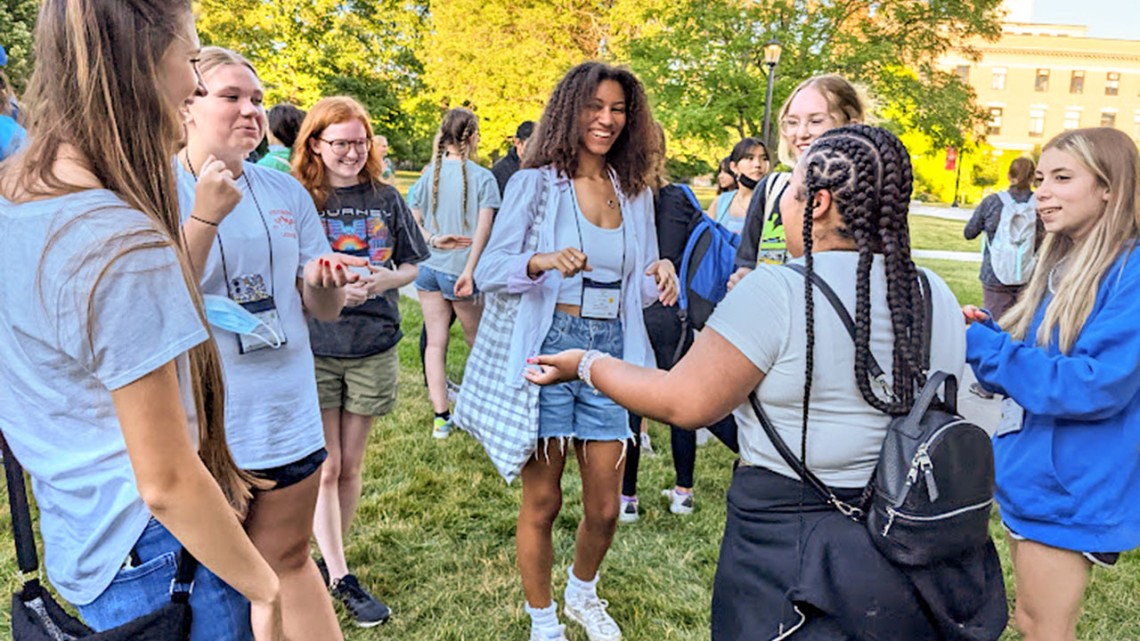
4-H teens chat with each other after the opening ceremony at Kennedy Hall.
Teens explore careers, campus life at annual 4-H conference
By Juan Vazquez-Leddon
More than 180 young people from across New York state and the Philadelphia area got a taste of campus life and future career paths during the annual 4-H Career Explorations Conference, June 28-30.
For 100 years, the New York State 4-H Office has hosted the event at Cornell, where teens learn about various career fields and the education needed to pursue them. They also experience aspects of campus life by living in residence halls, eating at dining halls and enjoying downtime by bowling and swimming at Helen Newman Hall. For some, it was their first time on a college campus.
“Some participants have said that they hadn’t considered going to college or didn’t know a particular expertise even existed,” said Alexa Maille, youth development STEM specialist for New York State 4-H. “Some also thought they really wanted to pursue something and then learned it’s really not for them, and so they are going to explore something else. That is valuable information.”
Cornell faculty and graduate students led engaged-learning programs in two tracks. In the University U track, for eighth graders and older, students rotated through workshops ranging from chemical engineering, adolescent development and the science of recycling to metamaterials, archaeology and on-skin interface prototyping. In Focus for Teens, for students entering grades 10 through 12, participants selected one program in fields such as computer security, astronomy, soil science, media design, women in the social sciences, psychology research and food science.
The “Be a Foodie and Eat the Science” program introduced teens to food science and food microbiology, preparing them for a mock investigation to solve a foodborne disease outbreak.
“The objective was to have them realize that there are practices that we should do, or avoid, to enhance food safety in a restaurant setting, and potentially apply that knowledge to their home cooking in the future,” said Rory Wang, doctoral student in food science, who created the curriculum with fellow doctoral student Amalia Beary. “We also wanted them to understand what happens when there’s a restaurant outbreak because there are so many forces working together trying to solve the case.”
In Stocking Hall, the teens searched for clues in a kitchen, took samples to a lab for analysis and interviewed a sick patient and the restaurant manager, roles played by Cornell graduate students and staff. The 4-H teens determined that the outbreak was caused by Staphylococcus aureus, or staph, but the source could not be pinpointed, which Wang said was done purposely.
“That’s because we intentionally had so many things wrong in the kitchen,” Wang said. “In the discussion, they were able to catch almost all of the red flags and provided meaningful observations and educated guesses.”
In Martha Van Rensselaer Hall, budding social scientists learned the building blocks of research through the Youth Investigators program conducted by the Program for Research on Youth Development and Engagement (PRYDE).
“Throughout the program, young people were exposed to quantitative and qualitative research methods, they collected some data, analyzed that data and learned how to share those findings with others,” said Kristen Elmore, assistant director of PRYDE.
Taking that blueprint, the teenagers created their own research proposals based on what they found interesting. A common thread emerged from those proposals: They wanted to know more about how social media and the COVID-19 pandemic affect anxiety and mental health.
The conference returned to its traditional in-person format after pivoting to a virtual conference last year due to the COVID-19 pandemic. This year, 90% of attendees were first-time participants, up from the usual 50%, Maille said.
During the closing ceremony, the teenagers said they appreciated the opportunity to reconnect and build relationships in person.
“It was especially great to hear because they came in as strangers and left as friends,” Maille said. “That relationship-building is really important for us.”
Juan Vazquez-Leddon is communications director for the Bronfenbrenner Center for Translational Research.
Get Cornell news delivered right to your inbox.
Subscribe
